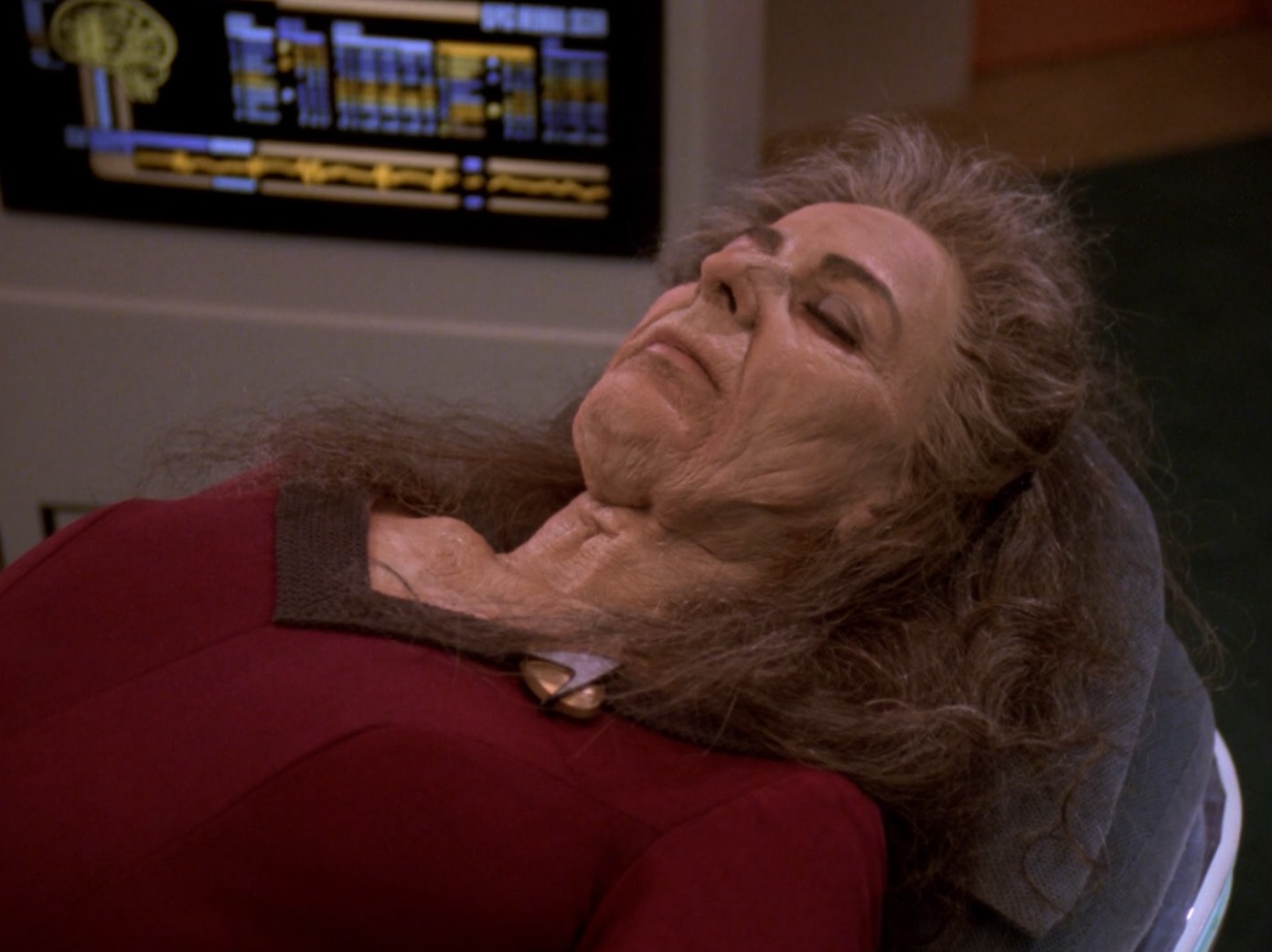So today we’re going to talk about how I cried for a solid 20 minutes because of Inside Out…
Umm, let’s restart that. We’re going to discuss emotions and how they are interpreted within Inside Out and Star Trek: The Next Generation‘s “Man of the People.”
Inside Out
Inside Out has such interesting concepts when it comes to emotion, and also very important ones.
The emotions, mind, and body play as a team in this movie. Even though the emotions are viewed as separate characters and entities, they still work with Riley and her cognitive processes. They are a personified version of how humans think. We don’t have one track minds- different experiences give us different emotions, making us ponder how to react.
Riley has plenty of emotions her first night sleeping in her new home. She hears the noise and sees the shadow of a bus, and we see Fear start to flip out going, “What is that? Is it a bear? It’s a bear!” After some dialogue, Anger inputs his thoughts about the move. He says, “This move has been a bust.” Fear believes there’s 37 things for Riley to be scared of, Disgust mentions the icky stench in the house, and Anger exclaims, “I can’t believe mom and dad moved us here!” Joy tries to lighten things up, saying things like, “We’ve been through worse” and “Let’s make a list of all the things that Riley should be happy about.” This is much like how we in real life process emotions. If I were Riley, I’d have similar thoughts. I’d be scared of the unknown, disgusted by dead rats and the smell, and pissed at my parents for making me move. Possibly, I’d try to focus on the positives to feel better (I say possibly as someone who struggles with depression, if you know you know). Inside Out exhibits emotion similar to Arnold’s Appraisal Theory of Emotion. The emotions see something happen in Riley’s life, and usually say aloud if it’s good or bad. Their thoughts related to emotions are then exhibited in conversation, and from there they figure out the action they must take. After all, anger somehow came up with the “let’s jump on a bus to Minnesota to fix the occurring problems.”
On a more important note, Inside Out reveals that it is important to express our feelings in order to get the help we need. After Bing Bong’s rocket gets sent to the dump, he is overcome with sadness and says, “Riley can’t be done with me.” Joy says, “Hey! It’s gonna be okay, we can fix this. We just need to get back to headquarters. Which way to the train station?” Joy tries to pull him, but he says, “I had a whole trip planned for us” and stays put. Joy keeps trying to cheer him up to no avail. On the other hand, Sadness says, “I’m sorry they took your rocket. They took something that you loved. It’s gone, forever.” The two continue to talk about Bing Bong’s feelings, and he ends up crying and feeling better. Joy is like Riley in the beginning of the movie, pushing to hide feelings and avoid the problems to “stay positive.” On the other hand, sadness is like Riley at the end of the movie, pushing to express feelings in order to acknowledge and overcome them.

Star Trek: The Next Generation
I think it’s safe to say the episode “Man of the People” was weird.
I’d consider this episode an opposition to the Theory of Emotional Construction. This theory claims emotion as something that doesn’t happen to you, but rather something that is constructed. This episode shows emotion as something that happens to you.
We watch Deanna Troi deteriorate throughout the episode both mentally and physically after the “funeral meditation” with Alkar. Picard confronts Alkar after the autopsy of Alkar’s (not) mother to figure out what has been done to Troi. Alkar tells Picard, “You see, I discovered long ago I had the ability to channel my darker thoughts, my unwanted emotions to others, leaving me unencumbered.” He later says, “She’s an empath. I was reasonably certain I could establish a link with her. Frankly, I was amazed when I saw how quickly she’d aged. Usually my receptacles survive for years.”
Emotions are looked at as transferrable. It is also clear that it’s easier to transfer them onto empaths, which are people that can feel what others are feeling. Dr. Crusher called these transferred emotions on Troi “psychic waste.” It is as if emotion takes control of the person depending on how much dark emotion is transferred. Troi becomes a completely different person- more sexual, cruel, and attached. They happen to her; she doesn’t construct them. When the emotions transfer back to Alkar, he grows old and dies. He has no control of them.




 Something that struck me was how Fry blamed Leela for the fact that Bender flushed himself down the toilet, a phrase I didn’t think I would ever type in an academic setting. He specifically blamed her emotions. This is something I’m definitely going to be thinking about during this current module.
Something that struck me was how Fry blamed Leela for the fact that Bender flushed himself down the toilet, a phrase I didn’t think I would ever type in an academic setting. He specifically blamed her emotions. This is something I’m definitely going to be thinking about during this current module.